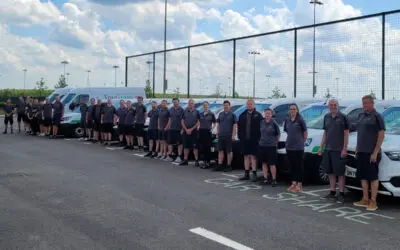As the seasons change and green spaces cry out for attention, the demand for lawn care and landscaping services continues to rise. Whether you’re a seasoned entrepreneur or just starting out in the field, mastering the art of marketing is essential for your business’s growth and sustainability.
In this comprehensive guide, we aim to equip landscaping and lawn care professionals with the tools they need to thrive in a competitive market. From understanding the unique dynamics of the industry to harnessing the power of digital platforms, we’ve curated a list of the 15 best marketing strategies that have proven successful time and time again.
But before we dive into the strategies themselves, let’s take a moment to appreciate the landscape (pun intended) of the industry as a whole. The landscaping and lawn care sector encompasses a wide range of services, including lawn maintenance, landscape design, hardscaping, and more. With homeowners, businesses, and municipalities all seeking to enhance their outdoor spaces, the demand for skilled professionals in this field remains consistently high.
Whether you’re looking to attract new clients, retain existing ones, or simply establish a strong brand presence, our goal is to provide you with actionable insights that will propel your business forward. So grab your tools and get ready to dig into our top 15 landscaping and lawn care marketing strategies.
Why Do You Need Marketing for Your Landscaping or Lawn Care Business?
 Why exactly do you need marketing for your landscaping or lawn care business? Let’s break it down.
Why exactly do you need marketing for your landscaping or lawn care business? Let’s break it down.
First, effective marketing is essential for getting more business. In a competitive market, simply relying on word-of-mouth referrals or traditional advertising methods may not be enough to keep your schedule filled with clients. By implementing targeted marketing strategies, you can actively promote your services to potential customers who may not have otherwise been aware of your business.
In addition, marketing allows you to reach a wider audience. With the rise of digital platforms and social media, the opportunities for reaching potential clients have never been greater. By leveraging online channels, you can showcase your work, share customer testimonials, and engage with your audience in meaningful ways—all of which can help to expand your reach and attract new clients.
But perhaps the most compelling reason to invest in marketing for your landscaping or lawn care business is the opportunity to communicate your value proposition effectively. What sets your business apart from the competition? Whether it’s your attention to detail, your commitment to sustainable practices, or your exceptional customer service, marketing provides a platform for you to highlight what makes your services unique and compelling.
In essence, marketing isn’t just about promoting your business—it’s about telling your story, connecting with your audience, and ultimately, growing your bottom line. Having a well-defined marketing strategy can make all the difference between blending in and standing out. So don’t underestimate the power of effective marketing—your business success may just depend on it.
Looking for a Digital Marketing Solution for Your Lawn Care Business? Get the Right Leads with Coalmarch’s Digital Marketing Platform.
Our List of the 15 Best Landscaping and Lawn Care Marketing Strategies
 Landscaping and lawn care businesses are essential for maintaining the beauty of outdoor spaces, but in order to attract clients and grow your business, it’s crucial to have strong marketing strategies in place. Here are our top 15 best landscaping and lawn care marketing strategies to help you stand out in the industry:
Landscaping and lawn care businesses are essential for maintaining the beauty of outdoor spaces, but in order to attract clients and grow your business, it’s crucial to have strong marketing strategies in place. Here are our top 15 best landscaping and lawn care marketing strategies to help you stand out in the industry:
1. Search Engine Optimization (SEO)
Fes strategies are as significant as Search Engine Optimization (SEO). For landscaping and lawn care businesses, SEO is the key to enhancing online visibility, attracting potential customers, and ultimately growing your client base.
On-page SEO techniques are crucial for optimizing individual web pages to rank higher and earn more relevant traffic in search engines. This involves incorporating relevant keywords, optimizing meta tags, headers, and images, and ensuring content quality and relevance.
Off-page SEO strategies complement on-page efforts by focusing on factors outside the website itself. This includes building high-quality backlinks from reputable sources, fostering social media engagement, and maintaining a strong online presence across various platforms.
Keyword research forms the backbone of effective SEO. By understanding the terms and phrases potential customers use when searching for landscaping services, businesses can tailor their content to match these queries and improve their chances of being found online.
2. Website Optimization
An attractive and user-friendly website is essential for making a lasting impression on potential clients. With more users accessing the web via mobile devices, mobile optimization is no longer a choice but a necessity. Responsive design ensures seamless browsing experiences across all screen sizes.
High-quality images and videos not only enhance the visual appeal of a website but also help showcase the quality of landscaping work. Including before-and-after photos, project portfolios, and instructional videos can significantly boost engagement and conversions.
Optimizing website speed and performance is crucial for retaining visitors and improving search engine rankings. Minimizing load times, optimizing code, and leveraging caching techniques are some ways to ensure a smooth browsing experience for users.
3. Local SEO and Google My Business
For local businesses like landscaping services, Google My Business (GMB) is a powerful tool for connecting with nearby customers. Claiming and optimizing a GMB listing ensures visibility in local search results and provides valuable information such as business hours, location, and contact details.
Maintaining accurate NAP (Name, Address, Phone Number) information across all online platforms is essential for local SEO. Consistency helps build trust with search engines and ensures potential customers can easily find and contact the business.
Encouraging customer reviews on platforms like Google, Yelp, and Facebook not only boosts credibility but also plays a significant role in local SEO rankings. Engaging with reviews, whether positive or negative, demonstrates responsiveness and commitment to customer satisfaction.
4. Content Marketing
Creating effective content is an opportunity for landscaping businesses to educate, inspire, and connect with their audience. Engaging and informative blog posts not only establish authority but also improve SEO by targeting relevant keywords and providing valuable information to readers.
Developing a content calendar allows businesses to plan and create content around seasonal landscaping topics, ensuring relevance and timeliness throughout the year.
Storytelling is a powerful tool for creating emotional connections with the audience. Sharing success stories, project highlights and behind-the-scenes glimpses humanizes the brand and fosters trust and loyalty among customers.
Video content is increasingly popular and can be leveraged to provide landscaping tips, showcase projects, and demonstrate expertise. From DIY tutorials to virtual tours, videos offer a dynamic way to engage with the audience and stand out from the competition.
5. Social Media Marketing
Choosing the right social media platforms for your business is essential for effectively reaching and engaging with your target audience. Whether it’s Facebook, Instagram, Pinterest, or LinkedIn, understanding where your audience spends their time online is key to success.
Consistency is also important when it comes to posting schedules and frequency. By maintaining a regular presence on social media, you can stay top-of-mind with followers and maximize engagement opportunities.
Running paid social media ads can amplify reach and target specific demographics with precision. Whether it’s promoting services, showcasing projects, or driving traffic to your website, paid ads offer a cost-effective way to boost visibility and conversions.
User-generated content is a valuable asset for social media marketing. Encouraging customers to share their experiences, photos, and testimonials not only creates authentic content but also fosters a sense of community and belonging among your customers and followers.
6. Email Marketing
Building and nurturing a targeted email list allows you to communicate directly with interested prospects and existing customers. Email campaigns sharing promotions, seasonal tips or company updates offer a personalized way to stay connected and drive engagement.
Crafting compelling email campaigns involves more than just sales pitches. Providing value through educational content, exclusive offers, and helpful suggestions can keep subscribers engaged and eager to open future emails.
Personalization and segmentation strategies help tailor email content to the specific interests and preferences of different audience segments, increasing relevance and engagement.
Measuring email marketing success requires tracking key metrics such as open rates, click-through rates, and conversion rates. Analyzing data insights allows you to refine your strategies and optimize future campaigns for better results.
Read More: The Top 5 Reasons RealGreen Customers Love Automated Marketing Assistant
7. Pay-Per-Click Advertising (PPC)
Pay-per-click (PPC) advertising offers a targeted and measurable way to reach potential customers online. Creating Google Ads campaigns allows businesses like yours to bid on relevant keywords and appear at the top of search engine results pages.
Setting budgets and bidding strategies ensures campaigns remain within financial constraints while maximizing exposure and clicks. Careful planning, including setting daily budgets and adjusting keyword bids, is essential for a successful PPC campaign.
Effective ad copywriting involves crafting compelling headlines and descriptions that resonate with your target audience and encourage clicks. A/B testing different ad variations helps identify which messages and visuals perform best and drive the highest conversions.
Monitoring and optimizing PPC campaigns in real time is crucial for maximizing ROI. Analyzing performance metrics, adjusting targeting parameters, and refining ad creative based on data insights can help improve campaign effectiveness and drive better results.
8. Local Networking and Partnerships
Establishing relationships with other local businesses can open up opportunities for cross-promotions, collaborations, and referrals. Consider partnering with nearby nurseries, garden centers, or home improvement stores to network with complementary businesses and potentially expand your reach.
Cross-promotions and collaborations allow businesses to leverage each other’s audiences and resources for mutual benefit. Partnerships like co-hosting events, sharing promotional materials, or offering bundled services can amplify marketing efforts and drive growth.
Participating in community events and sponsorships not only fosters goodwill but also increases brand visibility and recognition. You could sponsor a local sports team, participate in charity events, or host educational workshops, for example. Community involvement helps build trust and loyalty among customers.
9. Customer Testimonials and Case Studies
The power of showcasing success stories cannot be overstated. Customer testimonials and case studies provide social proof of a business’s quality, reliability, and customer satisfaction. Sharing real-life experiences and outcomes helps build trust with potential customers and instills confidence in their decision to choose your landscaping or lawn care service.
Gathering and presenting customer testimonials involves reaching out to satisfied clients and requesting feedback about their experience through email surveys, review requests, or direct outreach. Soliciting testimonials allows you to collect valuable endorsements that can be used across various marketing channels.
Creating detailed case studies that demonstrate expertise showcases real-world examples of your business’s capabilities and problem-solving skills. By highlighting specific challenges, solutions implemented, and measurable results achieved, case studies provide in-depth insights into the value proposition and effectiveness of your services.
Learn More: How American Turf & Tree Thrives With RealGreen and Coalmarch
10. Online Directories and Listings
Listing your business in local directories enhances online visibility and ensures potential customers can easily find and contact you. Make sure you have accurate, current listings in popular directories like Yelp and Yellow Pages in addition to industry-specific platforms – this not only improves local SEO but will drive leads as well.
Ensuring consistency in your business information across all online listings is crucial for building trust with both search engines and potential customers. From business name and address to phone number and website URL, accurate and up-to-date information helps avoid confusion and ensures a seamless customer experience.
Managing and responding to online reviews is essential for reputation management and customer satisfaction. Always thank satisfied customers for positive feedback promptly address concerns and resolve issues raised in negative reviews. Actively engaging with reviews demonstrates responsiveness and a commitment to customer care.
11. Yard Signage and Vehicle Branding
Professional yard signs can be extremely impactful. Placed strategically at job sites or in front of completed projects, lawn signage serves as a powerful marketing tool, attracting passersby’s attention and generating word-of-mouth referrals.
Vehicle branding offers a mobile marketing solution that reaches potential customers wherever the landscaping service travels. Whether it’s a branded vehicle wrap, magnetic signs, or decals, vehicle branding turns everyday commutes and errands into promotional opportunities, increasing brand visibility and recognition.
Design tips for effective signage and branding include keeping messaging clear and concise, using high-quality graphics and images, and ensuring branding elements are consistent with your business’s overall visual identity. A memorable and visually appealing design increases the likelihood of attracting attention and leaving a lasting impression.
12. Analytics and Performance Measurement
Tracking website traffic and conversion rates provides valuable insights into the effectiveness of your marketing efforts and helps identify areas for improvement. Analyzing key metrics via Google Analytics or other tracking tools allows you to make data-driven decisions and optimize your online presence.
Monitoring social media engagement and ad performance is essential for assessing the effectiveness of social media marketing campaigns. By tracking likes, shares, comments and clicks, you can gauge audience interest and adjust your content strategy accordingly.
Adjusting strategies based on data insights is critical for staying competitive as well. Based on your data analysis, you might find that reallocating ad spend, refining targeting parameters or pivoting content strategy will prove more effective.
13. Educational Marketing
Educational content creation – pieces like how-to guides, tutorials, or informative blogs — not only establishes your landscaping service as an authority in the industry but also provides value to potential customers. By addressing common pain points and offering solutions, you can attract and engage with your target audience.
Leveraging various promotion channels such as blog posts, social media, email newsletters, and video platforms allows you to reach a wider audience and distribute educational content effectively. Each channel offers unique opportunities for engagement and interaction with potential customers.
Encouraging engagement and feedback with educational content through comments, shares, and likes fosters a sense of community and encourages ongoing interaction with your brand. Additionally, soliciting feedback from customers allows your business to continuously improve its educational offerings and better meet the needs of your audience.
14. Customer Referral Programs
Establishing a customer referral program incentivizes satisfied customers to spread the word about the landscaping service to their friends, family, and colleagues. Providing incentives like special discounts, rewards or exclusive perks encourages participation and increases referrals.
Choosing the right incentives and rewards ensures your referral program is attractive to customers and motivates them to participate. For example, you might find that they respond to a percentage off future services, a free add-on service, or a gift card to a local restaurant – anything that’s compelling enough to encourage action.
Effectively promoting the referral program through various channels such as email newsletters, social media posts and website banners increases awareness and encourages participation. Clearly communicating the benefits of the program and how to participate ensures customers understand the value of taking part and will be motivated to do so.
Read More: How to Get Customers to Review Your Lawn Care Business
15. Direct Mail Marketing
The effectiveness of direct mail campaigns in the landscaping and lawn care industry lies in their ability to deliver tangible, personalized messages directly to your target audience’s doorstep. In an increasingly digital world, physical mail stands out and grabs attention, making it a valuable tool for reaching potential customers.
Target audience selection and list building are essential components of successful direct mail campaigns. By identifying and targeting households in specific geographic areas or demographics likely to be interested in landscaping services, you can maximize the effectiveness of your direct mail efforts.
Designing eye-catching and compelling direct mail materials is crucial for capturing recipients’ attention and encouraging them to take action. Whether it’s through engaging imagery, persuasive copy, or exclusive offers, creating a visually appealing and compelling mail piece increases the likelihood of a response.
Measuring the ROI of direct mail campaigns involves tracking key metrics such as response rates, conversion rates, and overall sales generated from the campaign. By analyzing these metrics, your business can evaluate the success of your direct mail efforts and make data-driven decisions for future campaigns.
Looking for Custom Printing, Direct Mail, and Customer Profile Insights? Get Started With Coalmarch!
Budgeting and Resource Allocation
 Determining an effective marketing budget involves balancing the costs of various marketing initiatives with the expected returns on investment. It’s important to consider all of your marketing channels: digital advertising, print materials, website, signage, etc. to ensure that your resources are allocated efficiently and effectively.
Determining an effective marketing budget involves balancing the costs of various marketing initiatives with the expected returns on investment. It’s important to consider all of your marketing channels: digital advertising, print materials, website, signage, etc. to ensure that your resources are allocated efficiently and effectively.
Allocating resources to the most impactful marketing strategies requires evaluating the performance of each initiative and prioritizing those that deliver the highest ROI. By focusing resources on strategies that generate leads, conversions, and revenue, you can maximize their marketing impact and achieve your goals more efficiently.
Tracking ROI for each marketing initiative allows you to measure the effectiveness of your efforts and make informed decisions about your budget and marketing plans. Tracking sales, leads, website traffic, and other metrics provides valuable insights into which strategies are delivering the best results and where adjustments may be needed.
Looking for a Comprehensive Print and Digital Marketing Solution?
Creating essential marketing strategies involves a lot, from optimizing your website and leveraging social media to nurturing customer relationships and maximizing ROI through targeted campaigns. If you’re searching for a comprehensive print and digital marketing solution to elevate your lawn care business, it’s important to partner with a company that understands your business and your specific needs. That’s where the experts at Coalmarch come in.
With expertise in both print and digital marketing and a deep industry knowledge of lawn care and landscaping, Coalmarch offers a tailored approach to help you reach your business goals. From crafting engaging content to designing eye-catching print materials, Coalmarch will provide the tools and support necessary to propel your business forward. Get started with Coalmarch today and watch your business thrive in the green spaces of success!
Let’s talk about your business! Get in touch today for a free consultation: https://www.coalmarch.com/contact-us
FAQs
What are landscaping and lawn care marketing strategies, and why are they important for my business?
Landscaping and lawn care marketing strategies encompass a range of tactics aimed at promoting your services, attracting new clients, and retaining existing ones. They’re vital for your business because they help you stand out in a competitive market, increase brand awareness, and ultimately drive revenue growth.
How can effective marketing strategies help me grow my landscaping and lawn care business?
Effective marketing strategies can facilitate the growth of your landscaping and lawn care business by expanding your client base, increasing customer loyalty, and boosting revenue streams. By leveraging various marketing channels and tactics, you can reach a wider audience, generate more leads, and convert them into paying customers.
What are some of the most successful marketing channels for promoting landscaping and lawn care services?
Some of the most successful marketing channels for promoting landscaping and lawn care services include local SEO, social media platforms like Facebook and Instagram, and targeted email campaigns. These channels allow you to connect with potential customers in your area, showcase your expertise, and communicate your unique value proposition effectively.
How do I identify and target my ideal customers through marketing strategies?
Identifying and targeting your ideal customers through marketing strategies involves understanding their demographics, preferences and pain points. Conduct market research, analyze customer data, and create buyer personas to tailor your marketing efforts and messages to resonate with your target audience effectively.
What role does branding play in landscaping and lawn care marketing, and how can I establish a strong brand presence?
Branding plays a crucial role in landscaping and lawn care marketing as it helps differentiate your business from competitors, build trust with customers and convey your company’s values and personality. To establish a strong brand presence, focus on creating a memorable logo, consistent visual identity and compelling brand story that resonates with your target audience.
What are some cost-effective marketing tactics that can yield high returns for my business?
Cost-effective marketing tactics that can yield high returns for your landscaping and lawn care business include leveraging social media platforms for organic content promotion, optimizing your website for local SEO to improve visibility in search results, and implementing referral programs to incentivize satisfied customers to recommend your services to others.
Schedule a free demo today to see how RealGreen
can help you grow your lawn business!
Recent Posts

Aimee Rametta serves as Chief Marketing Officer for WorkWave, where she drives marketing strategy and operations to raise awareness and generate demand for WorkWave’s portfolio of field service management solutions. In overseeing WorkWave’s marketing department, Aimee empowers her team to execute strategic initiatives across marketing segments, whether it be demand generation, events, communications, digital marketing, social media, design or marketing automation.



